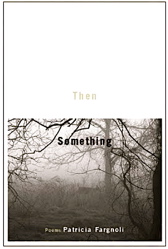~JANET MCCANN~
PATRICIA
FARGNOLI: THEN,
SOMETHING
The work
is dominated by water, birds, animals.
Many scenes leap
suddenly into focus. And yet
the metaphysical search is not abandoned.
This book makes the reader ache
beautifully. Its moving meditations on aging, loss, and sorrow, framed
in striking nature imagery, both remind us of our own griefs and
enhance our appreciation of the natural world. The poems make me think
of Mary Oliver’s recent work, but Patricia Fargnoli’s has a more
tentative, more questioning metaphysics. When all comes to an end, the
poems ask, what lasts? There are exploratory forays toward answers, but
no conclusive affirmation. The title is from Frost, whose “For Once,
Then, Something” recounts the experience of someone looking constantly
down wells and at last seeing “something” in the clarity of the
water–“Truth? A pebble of quartz?” He does not know what he is seeing,
but something is there, and the seeker must be satisfied with that.
Even the attractive cover suggests this vision, with its photograph of
a misty landscape in which an animal-a deer?–can barely be
distinguished. recounts the experience of someone looking constantly
down wells and at last seeing “something” in the clarity of the
water–“Truth? A pebble of quartz?” He does not know what he is seeing,
but something is there, and the seeker must be satisfied with that.
Even the attractive cover suggests this vision, with its photograph of
a misty landscape in which an animal-a deer?–can barely be
distinguished.
Pat Fargnoli is former Laureate of New Hampshire;
her previous collections include Necessary
Light, winner of the 1999 May Swenson Poetry Prize and published
by the Utah State University Press, and Duties of the Spirit, published by
Tupelo Press in 2005, and winner of the Jane Kenyon Award for
Outstanding Book of Poetry. She also has two outstanding chapbooks, Small Sounds of Pain (Pecan Grove
Press) and Lives of Others
(Oyster River.) Each of her collections has a cohesiveness that
maximizes its emotional power–the reader is listening to a distinct,
clear voice, and this voice changes as the poet ages and her
circumstances alter.
Then, Something
is divided into five sections, the first of which establishes the tone
with poems of an older woman, looking back at what she has valued,
beautiful things and homely. The first poem is a moving list of such
things which concludes ... “take nothing, / take less than nothing and
even less than that. Remove your shoes, place your pulse on the table,
/ release breath. Leave behind the scars on your finger, your thigh,
the long one over your heart.” The long lines of these poem are
like a great rush of breath, suggesting a whole life being indrawn,
exhaled.
The second section contains a long poem or sequence,
“Pemaquid Variations,” which explores Fargnoli’s many related themes as
the small and vulnerable consciousness is pictured next to the
limitless ocean. The speaker has picked up a few mementos:
Stones’ weight in my pockets,
driftwood,
a worm-pitted
scrap, gull-feather dried, hollowed
light as wind.
The scenes of the ocean and shoreline, sparely and
evocatively sketched, alternate with the speaker’s attempt to
understand the world, the infinite and impenetrable other. The
conclusion shows her acceptance of finitude and yet rebellion against
the uncrossable barrier:
The sand is the sea’s brother.
Sky opens out beyond my greed to
understand it, and I
am alone here, wandering across
the breach,
carrying a scavenged branch as
walking stick to scratch my name.
Throughout the collection, Fargnoli’s poems shift
back and forth between long ago and the present, personal losses,
community losses. Especially powerful are those of the loss of the
mother in long-ago childhood, and the permanent void this early grief
caused. “The Losing” ends
In the field of my mother’s
absence,
two blackbirds are flying through
the wind-driven snow.
The work is dominated by water, birds, animals. Many
scenes leap suddenly into focus. And yet the metaphysical search is not
abandoned. Dante is a figure here, sometimes sheer metaphor, sometimes
apparently more. God hides as a possibility behind some of the images.
The universal desire for divinity, for permanence, seems to affect
nature too:
the
small prayer of the red-tailed hawk
Free of the earth and the hungers
of the earth
let me spin above the firelds,
let me rise in the thermals,
let me fall and rise, fall and
rise.
The poems are formally intriguing as well. Some are
in flexible couplets, some in invented forms, such as “Lullaby for the
Woman Who Walks into the Sea,” or semi-forms, such as “Almost Ghazal
with Thoughts Toward Spring.” Falling rhythms characterize the
lines; in some, the lines seem to reach out and withdraw like waves,
echoing the sea-patterns of the poems. The forms fit the elegiac tone
of much of this work, being just suggestions of traditional patterns,
and not forcing the flow of thought and image into rhyme.
The directness of these poems is part of their
appeal – they settle for nothing, but represent an intense and honest
search. At times the glimpse of the patch of white at the bottom of the
well is there, and at other times it isn’t; there is only the keen
grief at past and coming loss. Yet these are not altogether sad poems,
for they evoke the beauty of things in their passing. The earth has its
own celebrations, its sacraments, as she demonstrates in “The Gifts of
Linneus”:
. . . this too, high-bush
blueberry whose bright
gems gather a
sheen of morning dew, their stain
on my willing tongue.
And here is New England aster its
flowers
bluer than
wine. Eat and drink: here, now,
on this giving earth, its
sacraments.
As for Oliver, as for Frost, for Pat Fargnoli the
absolute mystery of nature is itself a consolation.
Then, Something,
Patricia Fargnoli. Tupelo Press, 2009. ISBN 978-1-932195-79-8.
$16.95
© by Janet McCann

|


![]()
![]()
![]()
![]()